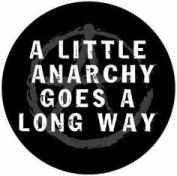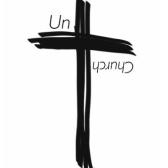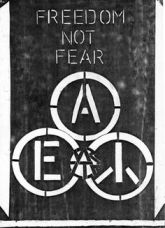 I wrote the following on my Facebook page yesterday in anticipation of the July 4th holiday: “American Christianity” will need to die before the seeds of Christ’s Gospel can grow again in this land. The nationalism rampant within the church’s walls is like a weed which chokes the life out of its witness. Preach Christ not America!
I wrote the following on my Facebook page yesterday in anticipation of the July 4th holiday: “American Christianity” will need to die before the seeds of Christ’s Gospel can grow again in this land. The nationalism rampant within the church’s walls is like a weed which chokes the life out of its witness. Preach Christ not America!
One of the replies to the post asked the question, “Are you saying the gospel and patriotism are mutually exclusive?” I put the question back to the inquirer, by saying, “How do you think Jesus would respond to your question, especially in light of his call to radical discipleship?”
To answer my own question here, clearly Jesus was an agitator against the State. He repudiated power relationships and domination systems. And he called us to live an all or nothing anarchistic Christian life. Leo Tolstoy said that the Christian life is impossible; it is mutually exclusive, and that’s why the Church has declawed it and made it more acceptable to people who could not meet its impossible standard. But the Way of Jesus cannot be tamed.
Jesus said you cannot serve two masters (Mt 6:24); you cannot have one foot in the world and one foot in the Commonweal of Love. The only master you can serve is yourself in submission to the Spirit in service to humanity (a trinity if you will). Jesus the Anarchist said, “Do not think that I have come to bring peace to the earth. I have not come to bring peace but a sword. For I have come to set a man against his father, a daughter against her mother, and a daughter-in-law against her mother-in-law, and a man’s enemies will be the members of his household. Whoever loves father or mother more than me is not worthy of me, and whoever loves son or daughter more than me is not worthy of me. And whoever does not take up his cross and follow me is not worthy of me” (Mt 10:34-38, NET). When you are an authentic follower of Jesus, agitating against power relationships and domination systems, there is going to be friction. Jesus’ hope was that the friction that occurred would ultimately bring healing and peace.
The Christian life is an all in life — an all or nothing life. Yes, it is impossible, but it is, nevertheless, the goal. Jesus said that with God nothing is impossible, and that we would do greater things that he did when he walked the earth. But you cannot hedge on your commitment to following Jesus. “Jesus said to him, ‘No one who puts his hand to the plow and looks back is fit for the [Commonweal of Love]’” (Lk 9:62, NET).
Later on in the gospel of Luke, Jesus again challenges us to consider the great sacrifice that it will entail to live in utter freedom, to live as a Christian anarchist. “In the same way therefore not one of you can be my disciple if he does not renounce all his own possessions” (Lk 14:33, NET). When we read the gospel with anarchist lenses it is almost unnecessary to say we are Christian anarchists. To be an authentic Christian is to be an anarchist.
Paul Dordal, 2016
 In the first century the Roman Empire had expanded its influence around the world. It built infrastructure, created jobs, and stationed military forces in its occupied or allied lands to keep the peace (Pax Romana) and quell unrest. The citizens of Rome thought of their Empire as the good guys. Romans were exceptional in many ways. Yet, they had a problem: Christians. Christians did not accord to Rome any respect, because they saw Rome for what it was: an evil empire opposed to the goodness of God.
In the first century the Roman Empire had expanded its influence around the world. It built infrastructure, created jobs, and stationed military forces in its occupied or allied lands to keep the peace (Pax Romana) and quell unrest. The citizens of Rome thought of their Empire as the good guys. Romans were exceptional in many ways. Yet, they had a problem: Christians. Christians did not accord to Rome any respect, because they saw Rome for what it was: an evil empire opposed to the goodness of God. (This post is a reflection of a non-anarchistic idea which I had previously preached several years ago, but which I now integrate into my new understanding of Jesus the Anarchist and his Commonweal of Love).
(This post is a reflection of a non-anarchistic idea which I had previously preached several years ago, but which I now integrate into my new understanding of Jesus the Anarchist and his Commonweal of Love). Anarchism is first and foremost about the theory and practice of individual freedom. While this freedom is complete, it is not a license to disregard the right of others to their freedom. A primal reason why a lot of people cannot begin to understand this freedom is because they are afraid, like me, to exercise it fully and responsibly. (We all like sheep have gone astray, Is 53:6).
Anarchism is first and foremost about the theory and practice of individual freedom. While this freedom is complete, it is not a license to disregard the right of others to their freedom. A primal reason why a lot of people cannot begin to understand this freedom is because they are afraid, like me, to exercise it fully and responsibly. (We all like sheep have gone astray, Is 53:6). I have been reflecting a lot lately on my use of the title Jesus the Anarchist. Just a few weeks ago I started the process of writing a manuscript entitled My Search for Jesus the Anarchist and the Commonweal of Love, which will integrate some of the writings I have posted on this blog.
I have been reflecting a lot lately on my use of the title Jesus the Anarchist. Just a few weeks ago I started the process of writing a manuscript entitled My Search for Jesus the Anarchist and the Commonweal of Love, which will integrate some of the writings I have posted on this blog. I took the picture attached to this post about five years ago while I was traveling through Amish country in Western PA. This pic was shot as part of a photography project I engaged in to capture nature scenes that reminded me of the seven “I Am” statements of Jesus as found in The Gospel According to St. John. I enlarged and framed this particular photo and it now hangs in my office at the hospital where I minister. It is entitled “I Am The Gate.”
I took the picture attached to this post about five years ago while I was traveling through Amish country in Western PA. This pic was shot as part of a photography project I engaged in to capture nature scenes that reminded me of the seven “I Am” statements of Jesus as found in The Gospel According to St. John. I enlarged and framed this particular photo and it now hangs in my office at the hospital where I minister. It is entitled “I Am The Gate.” In his very insightful blog, “
In his very insightful blog, “
 We who live in the modern state or under the crushing delusion of dogmatic religion are slaves, sometimes coercively, but mostly voluntarily. The mothers and fathers of anarchism have all written about the captivity of humanity by government and institutional religion. Enrico Malatesta said this bondage was so ensconced in our history humans have not even recognized it. “Thus being born and having lived in bondage, being the descendant of a long line of slaves, man, when he began to think, believed that slavery was an essential condition of life; and liberty seemed to him an impossible dream” (1900: 1). Emma Goldman said, “Anarchism is the great liberator of man from the phantoms that have held him captive….” (1910: 9).
We who live in the modern state or under the crushing delusion of dogmatic religion are slaves, sometimes coercively, but mostly voluntarily. The mothers and fathers of anarchism have all written about the captivity of humanity by government and institutional religion. Enrico Malatesta said this bondage was so ensconced in our history humans have not even recognized it. “Thus being born and having lived in bondage, being the descendant of a long line of slaves, man, when he began to think, believed that slavery was an essential condition of life; and liberty seemed to him an impossible dream” (1900: 1). Emma Goldman said, “Anarchism is the great liberator of man from the phantoms that have held him captive….” (1910: 9). In a few weeks I and hundreds of millions of other Christians will celebrate the Feast of Pentecost. Many traditionalist Christians call this the date in Christian history as the day the Church was born or the day when the Holy Spirit came upon the Church. But what if Pentecost is really about the beginning of the anarchist movement to implement Christ’s Commonweal of Love (the unkingdom of God)?
In a few weeks I and hundreds of millions of other Christians will celebrate the Feast of Pentecost. Many traditionalist Christians call this the date in Christian history as the day the Church was born or the day when the Holy Spirit came upon the Church. But what if Pentecost is really about the beginning of the anarchist movement to implement Christ’s Commonweal of Love (the unkingdom of God)?